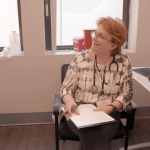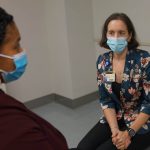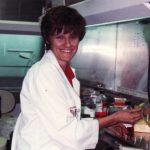It’s becoming clear that a generation shaped by the pandemic – young people who have come of age during a time of curb-side testings, contact tracing and mRNA vaccines – will be increasingly drawn to careers in public health. Tufts University says applications to its master of public health program tripled from 2019 to 2020. Brown University describes a “massive spike of interest” in its MPH program, especially from people of color. Nationally, graduate-level public health problems in 2021 saw a 40% increase in applications from the year before, according to the Association of Schools & Programs of Public Health.
But what’s it really like to work in public health?
Anne Kauffman Nolon can boil it down to a few words. Hard, frustrating, but rewarding. As the CEO of Sun River Health, one of the largest community health centers in New York State, Nolon has spent decades working to provide affordable health care to populations that need it the most. Her long career began when Richard Nixon was still president, and has seen the rise of AIDS, mental health issues, homelessness and of course, the Covid-19 pandemic.
“It’s never boring,” she says. “It hasn’t been, in 45 years.”
Nolon helped develop a single primary-care site in Peekskill into a sprawling network of 43 sites around the New York City area, with over 2,000 employees and serving more than 245,000 patients. Since the pandemic began, Sun River Health has administered over 165,000 vaccines, primarily to the underserved, and sometimes via a mobile unit. “We take it to a farmworker site or a farm, and we then go to the homeless shelter, and then we go on the streets into the housing projects,” Nolon says. Now, Sun River Health is helping the Biden administration distribute at-home testing kits.
While she’s coy about retirement – it will be a few years, at the least – Nolon marvels at how the pandemic is providing a “book end” to a career that grew from a response to historic inequities in public health. “Community health centers have their lineage in the civil rights movement,” she says. In fact, the original site in Peekskill was started in the early 1970s by four African-American women – Rev. Jeannette Phillips, Willie Mae Jackson, Mary Woods and Pearl Wood, dubbed Sun River Health’s “founding mothers” – who wanted to address the lack of affordable, quality health care in their community.
The women received a federal grant in 1975, part of a government program (first begun during Lyndon B. Johnson’s “War on Poverty” initiative) to fund neighborhood health centers in rural or inner-city areas. Before that, many patients would have to travel by bus, often with children in tow, to find doctors. The community-based model was famously promoted by the late H. Jack Geiger, a physician and civil-rights activist who had seen a similar model work in South Africa. Dr. Geiger died in 2020, but the concept of clinics that provide a mix of health care and social services lives on. Today, there are 1,400 Federally Qualified Health Centers – including Sun River Health – serving about 29 million patients.
But Nolon says the diminished investment in public health over the years is one of her greatest frustrations, especially during a pandemic. “You can’t stand up a public health system that’s been slowly shrinking,” she says.
A recent Washington Post article took a look at how the pandemic has ushered in medical breakthroughs in terms of vaccines, but that hasn’t been matched on the distribution side by an increase in staffing or funding for local health departments, many of which have shoestring budgets. An NPR article described public health as “always the bridesmaid,” never the bride, not as flashy as a new drug or medical device or surgical procedure.
Nolon says she’s heartened that young people may be newly interested in careers in public health. In September, AmeriCorps and CDC launched Public Health AmeriCorps to build a new generation of public health leaders. Back when she went to Columbia University in the 1970s for a master’s in public health, “there were very few people who knew what MPH was, other than ‘miles per hour,'” she laughs.
At the same time, “I have mixed feelings” about an influx of young Americans tackling careers in community health, as such careers require an enormous amount of commitment. “As a generation, the young people aren’t particularly driven that way,” she says. “They’re jumping a lot from job to job…and that doesn’t speak to a commitment like nursing or social work.” But “I would be very happy if [it] is going to happen,” she says.
Nolon, who herself grew up in rural Pennsylvania, adds that she can’t imagine taking any other career path. “I thought I was going to come to New York from Pennsylvania and make a difference,” she says, “but it was the difference that the community made on me. It was the impact that the founding mothers had on me. My work with them was fulfilling and still remains fulfilling, because it’s an experience that flows both ways.”
“The gift you get back from working in communities is huge.” ◼
Anne: One of the ways in which we reach out to our patients is do to that through mobile health centers in sparsely populated areas. We have an agricultural population that we work with. We’ve used it well even within an urban environment, like New York City, to reach homeless shelters; to be close to the patients that we serve.
TEXT: Anne Kauffman Nolon - CEO - Sun River Health, New York State
Anne: Sun River Health is a community health center. We're a well-rounded provider of primary and specialty care in the neediest of communities. We have 43 sites now that span this entire geography and 2,000 staff.
TEXT: Anne grew up on a dairy farm in Pennsylvania.
Anne: I stepped in at a very early age to help with the bookkeeping and with whatever help I could do at the barn. I just had an innate love for animals, especially cows. I really did want to be a farmer. But my mother did not want me to be a farmer, because farming wasn't the kind of business that she thought I could really support myself.
TEXT: Anne majored in Health Planning and Policy at Penn State University.
TEXT: After graduating in 1973 she volunteered at a county health department north of New York City.
TEXT: Four years later, she was assigned to run a community health center in Peekskill that was founded by four local activists.
Anne: The first amazing woman I met was the Reverend Mrs. Jeanette Phillips. She and the three other founding mothers went to community meetings, they stood before elected officials, they asked for healthcare services to be local. It was so much work and so much advocacy that had to take place. There were 12 staff members when I started, including one physician and a part-time dentist; some family planning programs. The first year we had about 500 visits. That's not very many patients.
TEXT: Patients pay fees on a sliding scale so funding operations was a constant challenge.
TEXT: Anne slowly built partnerships and merged with other medical groups to open clinics in other communities.
Anne: We gained patients by working in collaboration with the hospital system when hospitals don't have an answer. Either the community is inviting us or there’s no community health center anywhere around and a desperate need.
TEXT: Ten years later, Anne was running five clinics serving nearly 20,000 patients.
TEXT: Sun River uses mobile health vans to serve farm workers and hard-to-reach populations.
Anne: Agriculture for me is just the whole shebang. When I think about my mother's goal of not having me be involved in agriculture, in all society, agriculture somehow starts at the bottom. But our job is to elevate that to put it at the top.
TEXT: Sun River now serves 245,000 patients a year, including 10,000 agricultural workers.
Anne: I love knowing that we're caring for so many people. It blows my mind. For our staff, through COVID, through ups and downs; this is a work of love that doesn't ever go away.




